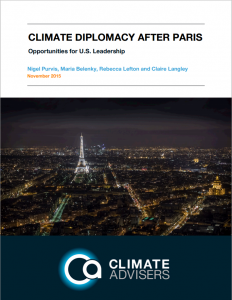Full Title: Climate Diplomacy After Paris: Opportunities for U.S. Leadership
Author(s): Nigel Purvis, Maria Belenky, Rebecca Lefton and Claire Langley
Publisher(s): Climate Advisers
Publication Date: November 1, 2015
Full Text: Download Resource
Description (excerpt):
This December’s global summit in Paris will represent a big step forward for climate diplomacy. UN Secretary General Ban Ki-moon has said that the expected Paris agreement will provide a compelling vision of a world free of extreme poverty, through the opportunities created by the transformation to a low carbon and climate resilient future.1
Paris may be remembered as a turning point – the moment when governments sent a clear signal that this complex global transformation is inevitable, beneficial and already underway.
U.S. policy makers, from President Obama and Secretary of State Kerry on down, have played a critical role in delivering this progress. They have led through unprecedented domestic climate action (which other nations are now matching), as well as through bilateral summits with heads of government from India, China and Brazil. Thanks in part to U.S. leadership, virtually all nations are doing more than ever before to combat climate change, and the institutional architecture underpinning global climate diplomacy is about to receive a major upgrade, with big improvements in transparency and accountability. Paris will be a major foreign policy victory.
Yet, the action expected in Paris will be only the beginning of what is needed. Coming out of Paris, attention should turn from what countries can do to reduce emissions on their own, as it has been this year, to what they can do together. It is unsurprising that the sum of the combined pledges is not sufficient to keep temperature rise below 2° C (3.5° F), as scientists and nations have agreed is essential. At best, the unconditional pledges nations have made in advance of Paris will deliver just over 40 percent of needed climate action now.2 The Paris agreement will slow the rate of growth in global emissions by about a third—but emissions will continue rising.3 Without a frontburner diplomatic process coming out of Paris to build on existing pledges in the near term, we could unleash potentially catastrophic and unmanageable climate impacts that our country and the world cannot risk.
